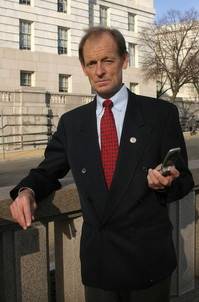 One of the freedom struggles of our time is undoubtedly the quest to obtain equal rights for Gay Americans. This week (August 16–20, 2010) will witness two landmarks of progress in this struggle.
One of the freedom struggles of our time is undoubtedly the quest to obtain equal rights for Gay Americans. This week (August 16–20, 2010) will witness two landmarks of progress in this struggle.
The first landmark will occur at 5:00 p.m. PDT on Wednesday, when (barring the intervention of a higher court ruling), same-sex couples in California will finally be allowed to legally marry. The importance of the overturning of Proposition 8 cannot be overstated. Because of the heroic ruling of Judge Walker, the struggle toward equality for Gay Americans in all states is taking an important step forward.
The second landmark will occur at 4:00 p.m. CDT on Friday, when Champaign-Urbana will host its first Pride Fest. While this event does not hold as much significance as the legalization of marriage in California, it is a serious accomplishment for the LGBT community in Champaign-Urbana. CU Pride Fest is a sign of an increasingly organized and powerful voice in our community. That voice will become more difficult for local citizens and their elected representatives to ignore.
This is a time of historic change and progress in our nation. Years from now our posterity may look back on this time and declare it a moment when the idea of equal rights for all citizens became more real. For all Americans it should be a time of immense pride in our nation that, by fits and starts, occasionally lives up to its promise of equality.
But not everyone is eager to extend equal rights to all Americans. Our own Representative Timothy V. Johnson (R-IL15) seems to be one of those people. Representative Johnson is quietly, yet distinctly, staking a position against the extension of equal rights to all Americans. While he is careful to not draw attention to his votes on this subject, his record is clear. Here are some examples:
On May 27 and 28, 2010 Representative Johnson voted against the repeal of the military’s “Don’t Ask, Don’t Tell” policy.
In November, 2007 Representative Johnson voted against the Sexual Orientation Employment Nondiscrimination Act (ENDA), which would have prohibited “employers from discriminating against any employee in respect to the conditions and privileges of employment based on the employee’s actual or perceived sexual orientations” (Sec. 4).
In May, 2007 Representative Johnson voted against the Local Law Enforcement Hate Crimes Prevention Act of 2007, also known as the Matthew Shepard Act. This law, eventually passed in 2009, “expands the 1969 United States federal hate-crime law to include crimes motivated by a victim’s actual or perceived gender, sexual orientation, gender identity, or disability.” Something Representative Johnson apparently opposes.
In July, 2006 Representative Johnson voted in favor of the Same Sex Marriage Resolution, which proposed a constitutional amendment defining marriage as “the union of a man and a woman,” and forbid any state from extending the benefits of marriage to same-sex couples. Fortunately, this particular bill was so extreme that even the Republican-controlled House of Representatives did not pass it at that time.
We are indeed in the midst of great and profound changes in the American experiment with democracy and equality. For many of us, this is a time to expand our notions of what equality means. But for many others, like our representative to Congress, this is a time to fight against progress and resist the expansion of equality to all Americans.
Our district has a choice to make this November about what kind of leaders we want to have representing us in Congress. While it may be difficult for many of us to care about which seemingly corrupt clown fills the Senate seat in DC, or the Governor’s mansion in Springfield, here in the 15th district we have a real choice to make. Does Tim Johnson really speak for our community when he votes against equal rights for same-sex couples? I don’t think so. Perhaps it is time that we elect someone who does truly represent our interests.
––Mark C. Foley








